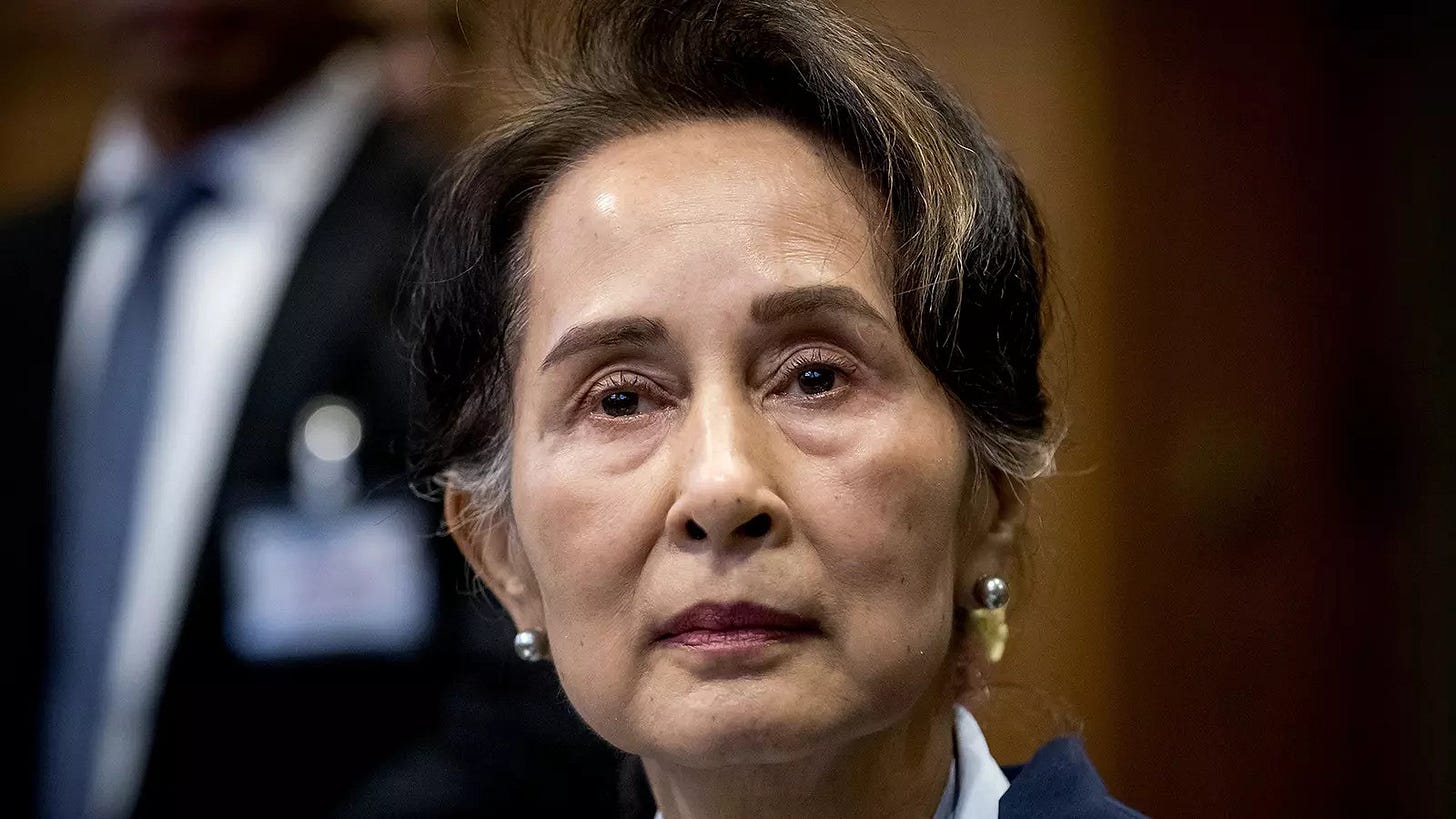The Twilight of Myanmar’s Aung San Suu Kyi
Imprisoned by the junta, democracy icon fades from view
By: David Scott Mathieson
Myanmar’s once internationally celebrated democracy icon Aung San Suu Kyi turns 80 years old on June 19, entering her fifth year of imprisonment following the country’s 2021 coup d’etat. Tried and convicted of 19 charges, all of them grotesquely trumped up, she was sentenced to 33 years, later reduced to 27, and is believed to be in a prison in the capitol Naypyidaw. She is one of 22,134 political prisoners in the country.
Aung San Suu Kyi is still very relevant to many people in Myanmar, especially to the majority Bamar Buddhist majority who have supported her since 1988. She is also still very popular amongst younger people, who voted in large numbers for her in the November 2020 elections. In one of the numerous campaigns to honor her milestone, Myanmar activists are planning on producing 80,000 video messages honoring Suu Kyi. Her youngest son, Kim Aris, has been active in Western media and visiting Myanmar diaspora groups around America and the United Kingdom and will complete an 80-kilometer marathon (run over eight days) to raise attention.
The Blue Shirt Initiative (BSI), a Myanmar research organization, published a recent survey, Four Years of Resistance-Public Perceptions of the Present and Future of Myanmar, that found that Suu Kyi was still the most ‘trusted’ figure in the country: with 32 percent expressing “quite a lot of confidence” and 48 percent “a great deal of confidence” in her. This is more than the National Unity Government (NUG) or Ethnic Armed Organizations (EAOs) and People’s Defense Forces (PDFs) fighting against the State Administration Council (SAC) regime.
However, this level of confidence and trust could well be largely symbolic and a legacy of Suu Kyi standing up to the military for three decades; it may not translate to her having solutions for the current conflicts. She is still an important figure in NUG circles, but that is because the NUG is factionalized between pro-NLD and Suu Kyi loyalists, newer revolutionary factions, and a new generation of leaders. It must be remembered that Suu Kyi didn’t appoint ministers in the NUG, nor has she had any direct involvement in its policy formulations as she has been effectively incommunicado.
As a result of her incarceration, she is quite distant from the day-to-day dynamics of the ‘Spring Revolution.’ Due to this and her advanced age, it is highly unlikely that she would have a direct role to play in any political solution, even if she were to be released tomorrow. The anti-SAC resistance is really a younger people’s revolution, and Suu Kyi would likely not be comfortable with its more decentralized and networked dynamics as opposed to her usual rigid hierarchy. The emerging relationships among Bamar and ethnic revolutionary actors would also be novel, and possibly uncomfortable, to her. If released, and assuming she could engage in some semblance of political action, Suu Kyi may well be welcomed as a venerated and charismatic leader, but largely titular.
Suu Kyi has never had, and likely never will have, the widespread support among many ethnic groups, especially in the Shan and Rakhine states. Her party won many seats in other ethnic states, but this was a combination of broad appeal of the NLD as opposed to the Union Solidarity and Development Party (USDP) which was seen as too close to the military, and most importantly, a vote against the military in both 2015 and 2020 to stay out of politics. Suu Kyi was also silent on the ongoing military abuses against civilians in ethnic states such as Karen, Karenni, and Kachin, something many of those nationalities will never forget, especially during the five years of the NLD administration.
Suu Kyi simply doesn’t have the cachet in the West or internationally to be used as effective bargaining by the military regime. She lost a great deal of Western support following her dismal disavowal of the Rohingya and all persecuted minorities by the military following her release from house arrest in late 2010, but definitely after the ethnic cleansing of the Rohingya in 2016 and 2017. The denouement of her international cachet was her dehumanizing performance at the International Court of Justice (ICJ) at the end of 2019, where she admitted abuses had occurred, but did not amount to genocide.
At her briefing to the United Nations General Assembly on June 10, UN Secretary General Special Envoy Julie Bishop mentioned Suu Kyi only once, in relation to Security Council Resolution 2669 from December 2022 that called “for the immediate release of all arbitrarily detained prisoners, including (President) Win Myint and Aung San Suu Kyi.” The American acting representative to the UN Economic and Social Council, Jonathan Shrier, in his remarks, failed to mention Suu Kyi at all, emphasizing the rights of Rohingya in Rakhine State. Such an omission from an American diplomat would have been inconceivable a decade ago. A July 2024 letter from US five senators, including Suu Kyi’s most prominent Congressional supporter, Senator Mitch McConnell, to the secretary of state and USAID administrator also failed to mention Suu Kyi.
However, the SAC is an adhocracy. Plans for an election announced for late-2025 could entail some sordid cooption of Suu Kyi to placate some quarters of the domestic population. The regime would be playing with fire if they do. Suu Kyi may be diminished to the world, but she still has a political legacy in Myanmar that can’t be discounted.
David Scott Mathieson is an independent analyst working on conflict, humanitarian, and human rights issues in Myanmar. He is a regular contributor to Asia Sentinel.


it was a small window of opportunity, but country suffers for her moral AND strategic failures.